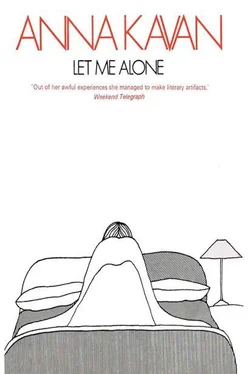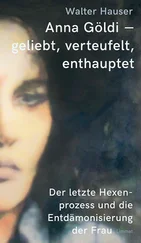As soon as she appeared in her hat and coat, he stood up and prepared to follow her out of doors.
‘Don’t bother to come with me,’ she said to him. ‘I’ve got a dress to try on. It will take me a long time.’
But Matthew, with the obstinate little smile on his face, did not seem to have heard. He insisted on coming, all the same.
‘Don’t wait for me,’ she said, when they were near to the shop.
But smilingly, softly, without speaking, he seemed to disregard her. He escorted her right up to the door.
She went inside hurriedly and left him standing on the pavement. Up to the fitting-room she went, and shut herself in the little mirrored box with the gay, flimsy dresses and the pleasant, slightly airless smell of materials and artificial lights. It was a relief to be shut away there in the bright, close, lighted box, away from Matthew and his endless, patient, obstinate pursuing. His insentient, dumb persistency was beginning again to give her a feeling of suffocation, as if she were being stifled in feathers. It was good to escape him. She stayed in the shop as long as possible. But when she came out, he was still there, staring at the brilliant windows.
‘Why didn’t you go on?’ she asked him, irritably.
‘I don’t mind waiting for you,’ he answered.
He carried her parcels for her, and walked stiffly along, keeping scrupulously to the outside of the pavement, protecting her. He pranced a little, as he walked. And when they crossed the street he took her arm firmly and steered her officiously across, like a zealous but somewhat inefficient sheep-dog: though she was much quicker and more expert at avoiding the traffic than he. She wished that his bowler hat did not come down so low on his head, making it seem more than ever like a smooth black ball: and that he wouldn’t stick quite so close to her, like a conscientious but unwanted dog. But most of all she resented his prancing, the way he cavaliered her about the streets — so annoying when she got on much better alone.
So much for the days. Anna spent a lot of time in the shops. She walked with Matthew in the streets and in the parks. She went with him to a theatre or to a cinematograph, or she sat with him in the ponderous, stuffy lounge of the hotel, or at meals in the dark dining-room, always alone with him. And he was attentive to her, very agreeable and obliging, though with a permanent look of reproach in his blue eyes. He contrived to make it clear that he considered himself very badly used. And at night, as bed-time drew near, the look of hurt reproachfulness deepened; he would stare and stare at her with an expression hovering between accusation and magnanimity. He was quiet and well-behaved. He made no more scenes. But each time that she went alone into her ugly bedroom she was conscious of his melancholy stare burning her retreating back. Silent and reproachful he was; he said nothing to her. But he never forgot, not for a single minute, his grievance against her. Nor did he allow her to forget.
Outwardly, officially, all was forgiven. He was very much the little Sir Galahad in his behaviour. The aggravating beam of Christian charity was in his eye again. And he was firmly seated on his chivalrous mount. He never followed her into the bedroom. Nevertheless, Anna felt herself threatened. She wondered when the bully would oust the knight-errant, and become active again. But it was not really the bully in him that disquieted her. There was something, ultimately, much more alarming: his complacency. She shuddered sometimes when she saw him smile, because he was so certain, so sure of everything. He could afford to let magnanimousness triumph over reproach, because he was so confident. It had never occurred to him, really, that he might not conquer her. In the end he was bound to get what he wanted. He simply waited. His waiting was so patient, so mindless, like a force of nature, unconscious. Would she be able to resist it for ever? She shuddered, and was afraid.
Matthew wanted to leave London. He was rather out of his element amongst all the traffic and the high houses; a bit washed out. He could not feel himself sufficiently important. So he wanted to go home, back to his own roost, where he really was somebody. He wanted to show off Anna, his wife, the new acquisition. But he was a little nervous of suggesting the move to her. A little afraid of being thought mean at thus curtailing their stay in town. He was very conscious of the money going out all the time.
Anna was rather relieved, if anything, when he made the proposal. The stuffy hotel, where the air came stalely, as if filtered through innumerable double windows, was becoming rather a nightmare to her. As was this prolonged solitude à deux. She wanted to get into a house with other people again, other human beings. Matthew’s strange inarticulateness had given her a craving for intimacy of speech. Not that she was likely to find it in the bosom of his family. She was rather curious to see the native haunts of this very queer specimen.
Matthew’s mother was fanatically Irish; the real Irish mixture of thriftlessness and enthusiasm, with a makeweight of mysticism thrown in. His father, dead some years, had belonged to a more devitalized type. The widow lived quite alone with her only other child — a daughter — in a big, inconvenient house at Richmond. But it was her son to whom she was really devoted. She willed him to come back to her.
MATTHEW took Anna to Richmond on the District Railway; which was a new experience for her. She was rather intrigued by the blunt-snouted electric trains nosing in and out of the tunnels. Hitherto her experience of travel had been mainly limited to motor-cars and first-class compartments.
Matthew was a little apologetic about it all. His eyes had a curious expression, humble and resentful together, as though the memory of the luxury to which she was accustomed had suddenly begun to insult him.
‘I’m afraid it won’t be quite the sort of life you’ve been used to,’ he said, with a sort of defiant humility. ‘You must take us as you find us.’
She understood that he was apologizing for his home. It surprised her rather. Were these things so important? She had never had any cause to consider them.
About three o’clock in the afternoon they arrived at Richmond station. Winter was very near. All was grey and dismal. Anna felt that the place repudiated her. If possible, she would have taken the next train back to town.
Matthew made some arrangement about the luggage, while she stood still, watching a man who was wheeling two bicycles up the platform. She felt cut off from every support. In her discouragement she looked at Matthew.
‘Shall we walk? It is only a little way,’ he said.
‘Very well,’ she agreed, spiritless.
They went out of the station and began to walk up the street. Presently they turned to the left between some small shops, and crossed a churchyard. The gravestones were like a mouthful of irregular teeth, beginning to decay. Anna was cold and dispirited.
‘It’s not far now,’ Matthew said, scrutinizing her. He seemed slightly anxious. Did he feel her dismay? She stared away bleakly at the doddering stones. ‘We shall soon be there.’
They entered a long alley between high walls. There were gardens behind, with houses looming. Slowly they traversed the long alley. Anna felt like an insect crawling in a narrow crack. They walked fast, but seemed to make no progress. She plodded on — cold — and rather despairing.
At the end of the alley came a road with villas, and a dog barking; they crossed another road, more important, then down a steep little hill beside a tea-house, and out on to another road. They now seemed to have dropped to a much lower level. There was a low-lying mistiness in the air.
Читать дальше












